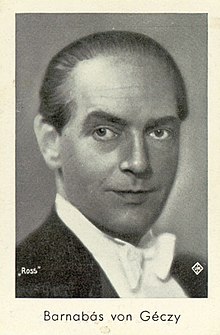Barnabás by Géczy
Barnabás von Géczy (born March 4, 1897 in Budapest , † July 2, 1971 in Munich ) was a violinist and orchestra conductor of Hungarian descent and one of the best-known Kapellmeister of the 1920s and 1930s in Germany.
Life
Géczy learned the first violin notes from a gypsy prímás in Budapest . He studied violin at the Budapest Music Academy , where he was a master student of Jenő Hubay . In 1919 he became concert master of the Budapest Opera . Due to the economic circumstances, Géczy left Hungary in the summer of 1922. When a job was advertised in the newspaper, he went to Trondheim , Norway , only with his violin and confidence in his skills . Since the director of the band in which he first played was unreliable, Géczy soon founded his own trio with the pianist Erich Kaschubec , who also played in Géczy's later orchestras. Géczy met his wife in Trondheim.
Géczy received a call to the Stockholm Opera and an offer from the Philadelphia Orchestra , but an offer from the Berlin Weinhaus Traube ( Leipziger Strasse ) was more lucrative, which is why he moved there in 1924.
From 1925 to 1937, the orchestra of Barnabás von Géczy was the house orchestra of the Hotel Esplanade and recorded numerous records. In 1932 Géczy won the competition for the Blue Violin of the newspaper 8 Uhr-Abendblatt , Michael Schugalté came second. In 1933/1934 Géczy's ensemble played in cabaret matinees at the Volksbühne Berlin . In 1938 he was appointed professor. Barnabás von Géczy also played with his orchestra on the radio, for example in August 1942 on the Reichssender Berlin in the program When the day comes to an end - a dance of melodies for the front and home , with speaker Heinz Goedecke . In 1944 Géczy, together with Willi Stech, succeeded Georg Haentzschel and Franz Grothe as the director of the German Dance and Entertainment Orchestra in Prague .
The orchestra made the last recordings in Prague at the end of March and beginning of April 1945. After the war, Barnabás moved from Géczy to Munich , where he put together a new ensemble in 1952, which became the house orchestra of Café Luitpold.
plant
Géczy was a virtuoso violinist and became the “ Paganini of 5 o'clock tea ”. In his arrangements and the line-up of his salon orchestra, he placed the string instruments in the foreground more than other orchestral directors of the time. He recorded a total of around 700 records for various companies in Berlin, mainly for Homocord , Parlophon , Telefunken and Electrola . He appeared at Polydor with his Munich ensemble .
Géczy and his orchestra took on the musical execution in the films Die - oder keine (1932), Eine wie du (1933), he was involved in the film Schlagerparade (1953). In the strip , the - or not he is also seen as an actor. The most successful piece was the Puszta Fox, it was sold around 10 million times.
literature
- Schnoor, Hans: Barnabás von Géczy. Rise of an art. Dresden: Verlag der Dr. Güntzschen Foundation undated (around 1937) with discography BvG on Electrola records.
Web links
- Media by and about Barnabás von Géczy in the catalog of the German National Library
| personal data | |
|---|---|
| SURNAME | Géczy, Barnabás of |
| BRIEF DESCRIPTION | Hungarian conductor, violinist and Kapellmeister |
| DATE OF BIRTH | March 4, 1897 |
| PLACE OF BIRTH | Budapest |
| DATE OF DEATH | 2nd July 1971 |
| Place of death | Munich |
